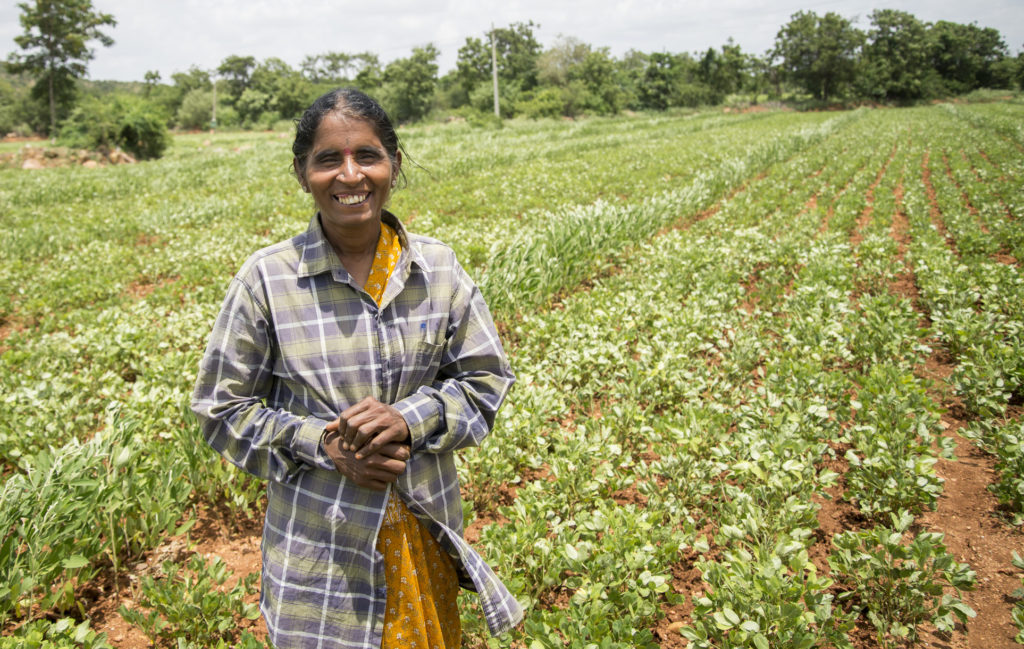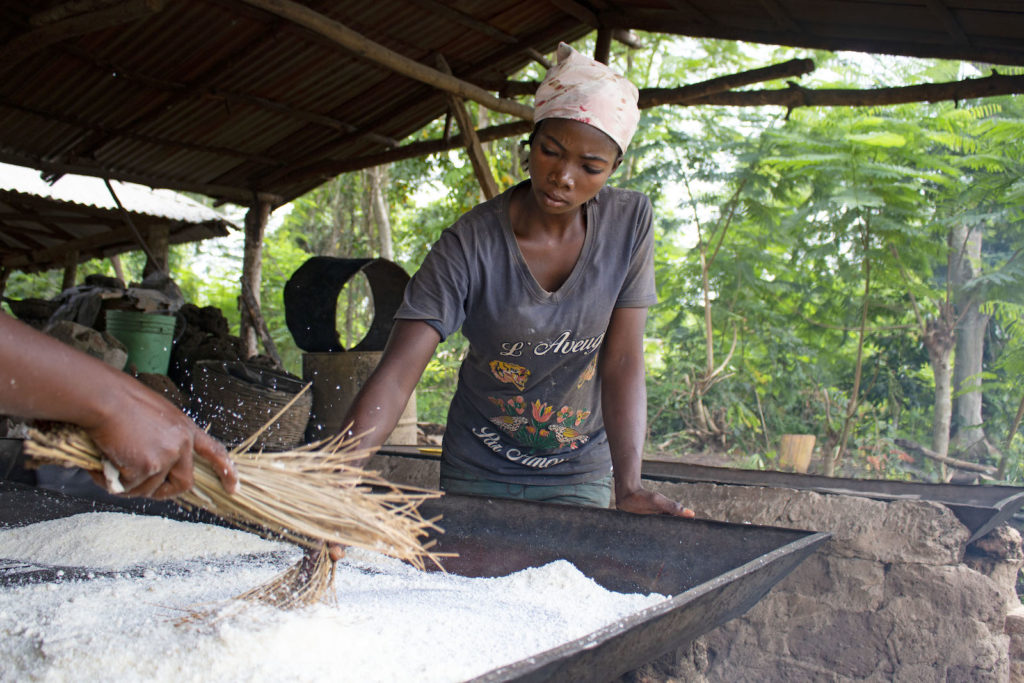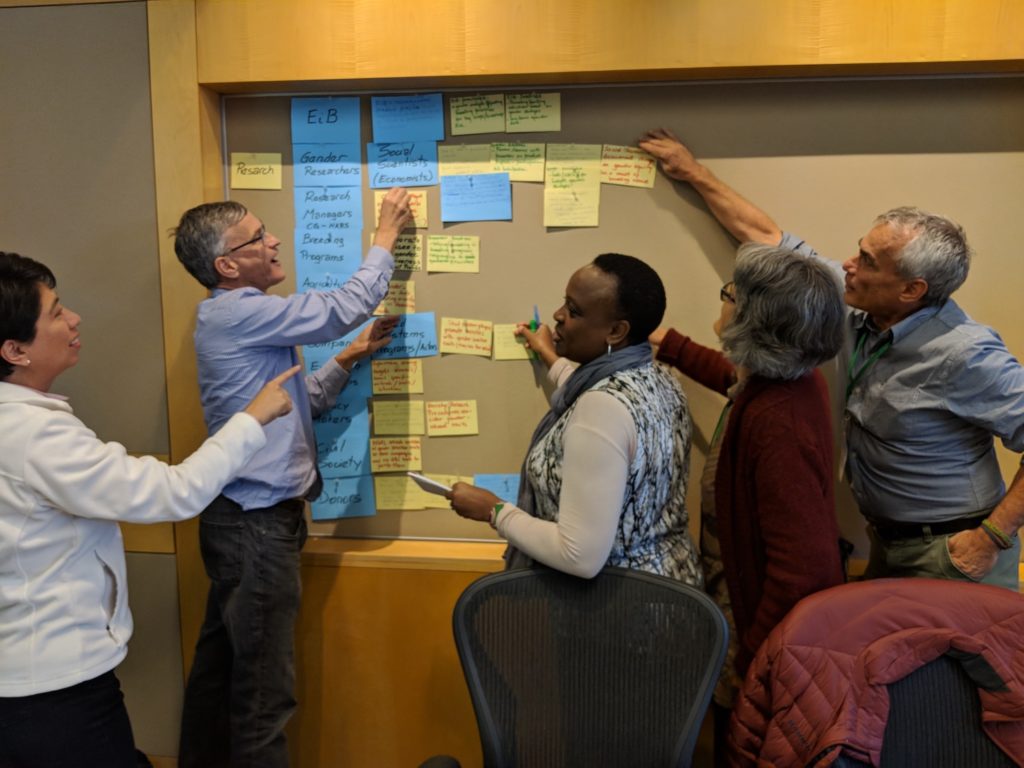By: Holly Holmes and Clair Hershey, CGIAR Gender & Breeding Initiative
Over the past few decades, gender initiatives across CGIAR have created broad awareness among scientists about the need to consider the impact of new agricultural technologies on both men and women. However, even with this heightened awareness, breeding programs typically ask questions about the gender impact of a new plant variety or animal breed only in the final stages of evaluation or release.
Women’s trait preferences often differ from men’s, and consequently, varieties may not be adopted because women’s interests were not considered, or varieties that are adopted can even have a negative impact on women’s well-being – such as by exacerbating their daily workload or leading to less control over marketing decisions.

A GROUNDNUT FARMER IN INDIA. NEW VARIETIES DEVELOPED WITHOUT CONSIDERING WOMEN’S NEEDS OR PREFERENCES COULD HAVE A NEGATIVE IMPACT ON THEIR WELL-BEING. PHOTO: ICRISAT
In this context the CGIAR Gender and Breeding Initiative (GBI) envisions the development of a comprehensive toolbox aimed at the analysis and incorporation of gender perspectives from the very beginning of a breeding program, right through to implementation and impact assessment. The toolbox will be used to assure the gender relevance of tools in the CGIAR Excellence in Breeding Platform (EiB) but will also provide support to national agricultural research institutes and other breeding programs.
Towards this, the Initiative held a workshop from November 12-13 at Cornell University to create a space for gender specialists, breeders and others to review two prototype tools and jointly work toward their refinement for the next step of field testing. The two complimentary tools are the G+ Customer Profile Tool and the G+ Product Profile Development Tool.
“A G+ Customer Profile identifies and disaggregates by gender the users for a specific product of the breeding program,” says agricultural economist, Alastair Orr, who presented an overview of the tool.
“So just as a product profile defines the new breeding product, the G+ Customer Profile gives the breeding program a clear picture of who will potentially be using the new variety – paying special attention to gender issues. It outlines the number of users, their geographic location, socio-economic characteristics, varietal preferences, and the reasons for these preferences,” he explains.
Incorporating this gender dimension means that the traits that are important for women are both captured and reflected in the design of new products. Using the tool will help ensure that breeding programs explicitly address the needs and preferences of different segments of a target.

A YOUNG WOMAN IN NIGERIA TOASTS GARI, A PROCESSED PRODUCT MADE FROM CASSAVA. PHOTO: H.HOLMES/RTB
In small working groups, participants prepared and discussed examples of G+ tool implementation, identifying what worked and what should be improved moving forward. In the customer profile session, groups developed case studies for virus resistant chickens in Tanzania, cassava for young women in Nigeria, potatoes in Kenya, and groundnut in India.
“We found that the tool is a great starting point to discuss in specific details who the ‘customer’ is, what their needs are and how many they are and how we are positioned to serve them. Having this conversation helps us to interrogate our intentions and plans more sharply,” says Esther Njuguna-Mungai, gender specialist at the International Crops Research Institute for the Semi-Aris Tropics.
‘’A key constraint that came up during our discussions is the realization that programs don’t always have enough information or data, that is available in the form and rigor required, to be a basis for decision making about the customers, at the time when the decisions need to be made. An evidence table could collate information on all the market segments, and more specific criteria developed for selecting target segments,” adds Esther.
Another key point that arose during the group discussions was the need for a process involving structured conversations between breeders, gender specialists, marketing specialists and others to arrive at the final customer segmentation and prioritization for breeding.

DURING THE WORKSHOP, PARTICIPANTS PREPARED AND DISCUSSED EXAMPLES OF G+ TOOL IMPLEMENTATION. PHOTO: CORNELL UNIVERSITY
Building on the customer profiles, working groups had a first go at testing the product profile development tool for sorghum in West Africa based on prior detailed gender work by Eva Weltzein, Honorary Associate, Agronomy Department, University of Wisconsin – Madison.
A typical product profile is a set of targeted attributes which a new plant variety or animal breed is expected to meet in order to be released. Attributes are described as traits with a specific value, for example, grain yield of 11 tons per hectare or higher.
“The G+ Product Profile Development tool provides a way for breeding programs to inspect the gender dimension of these traits when they are included in a product profile to determine whether it has any implications for gender equity. It assesses whether a trait meets the minimal ‘do no harm’ standards and allows breeding programs to characterize the benefits of a trait for women users,” explains Vivian Polar, gender, monitoring and evaluation specialist with the CGIAR Research Program on Roots, Tubers and Bananas.
One major point that came up from the discussion was that the exercise of using the tool should carefully weigh the importance of addressing the status quo versus a future projection through foresight analysis.
“Traits that are desired today, and their impact on women, will change in the future and this is particularly important because breeding takes time. Factors like urbanization, increasing incomes, climate change, and mechanization among others, play a role in influencing this, and need to be considered too,” says Vivian.
The workshop made good progress toward understanding the G+ prototype tools and the refinements they need. The tools will be further revised, and their concepts incorporated into a proposal for a project to test the G+ product profile development tool in selected pilots with breeding programs.
These pilots will ultimately lead to a seamless integration of gender-responsive trait prioritization into breeding programs. The EiB will be the principal conduit for the G+ tools, but they will also be used by a range of other teams outside the Program.
GBI will continue to analyze the need for new tools and protocols and develop them based on demand and resources.
See the workshop presentations:
- Gender and social targeting in breeding by Alastair Orr
- Gender analysis in the CGIAR agricultural research: Setting the scene by Alessandra Gaile
- Reality check – can we breed for all ‘traits’? by Eva Weltzien
- Whose priority? Reflections on priority setting in the sciences by Stephen Hilgartner
- Overview of the CGIAR Gender and Breeding Initiative by Graham Thiele, Vivian Polar, Jacquline Ashby and Hale Tufan





